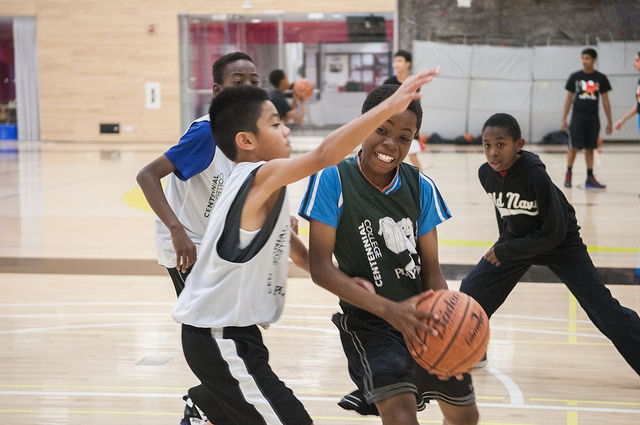Basketball is one of the best sports for practicing and improving executive function skills. Not only is it popular, it’s a complex game that requires physical coordination and mental agility. Be it the focus required to shoot a free throw or the self-awareness to know the level of one’s skills when choosing to take a shot or make a pass, basketball requires constant decision-making and problem-solving.
Parents and coaches have a golden opportunity to take the executive function skills required in basketball and leverage them into skills that can help children outside of the game. First, it’s important to know how to recognize ways of building and improving executive functions in the team sport of basketball.
Focus – The executive-functioning skill of focus requires sustained attention to a task. The fast pace of basketball necessitates that players focus on what they are doing, whom they are guarding, and where the ball is at all times. Focus also involves the skill of task persistence. Youngsters who want to better their skills in basketball can typically do so by way of individualized practice to improve skills in dribbling, shooting free throws or three pointers, or boosting their jumping abilities. All of these require persistence and effort.
Self-Awareness – The skill of self-awareness involves understanding one’s own strengths and weaknesses as well as the strengths and weaknesses of teammates. For example, youngsters who are not very good at dribbling should know to give the ball quickly to a point guard who is adept at taking the ball up the court. Similarly, players use self-awareness skills at the end of a close game in knowing to whom they should pass the ball for taking a final shot.
Self-Control – Self-control is a very important skill in dealing with the frustration of losing or getting fouled on the basketball court. Players need to realize that getting a hard foul is simply part of the game and that they should not retaliate against the player who fouled them. Self-control is also needed in considering whether a shot’s potential for success is good or bad and choosing to take only good shots. Self-control can be most important when it involves reacting to referees’ calls, particularly in basketball. A fair amount of subjectivity occurs related to foul calls since referees can see only so many things at a time, and players, parents, and coaches can get frustrated with referees’ decisions. Displaying self-control and not arguing but accepting the referee’s authority are important skills in this sport for kids and parents.
Here are a few suggestions for parents, clinicians, and educators about how to build and improve executive functions in the team sport of basketball:
Ask questions about how favorite basketball players became stars. Guide children in thinking about the sustained effort, attention, and focus they used in getting there. Use this as a social story to help them understand that they can do the same thing in other areas of their lives.
Discuss how basketball players need to handle bad calls against them or deal with injuries. Talk about the need for self-control and flexibility. One way to guide this discussion would be consider when players get lucky and get a good call, gaining an advantage from it, and how this can affect them. Draw the discussion into broader topics about fortune and misfortune in people’s lives.
Guide discussions about players’ areas of strength and weakness. Parents could have these discussions with their children or coaches with their players. Children who are fans of professional basketball could be encouraged to consider one of their favorite players. Basketball is a great opportunity to consider strengths and weaknesses due to players’ positional requirements, as aside from a few superstar players such as LeBron James, Kevin Durant, and Russell Westbrook, most players do not excel in all areas of the game. For example, shorter players are likely to play guard and be better at dribbling and movement than larger players, who are likely to be better at rebounding and blocking shots. Use such talks to help children develop self-awareness regarding their own strengths and interests to encourage them to pursue activities and put themselves into places where they are more likely to succeed.
Team sports afford the opportunity to practice, develop, and build executive-functioning skills, and physical activity is part of a balanced Play Diet. Learn more about these skills, and read how physical activity in general can help kids with ADHD focus. Do you have a child who loves sports? Let us know how you talk about in-game skills as real-life lessons. Talk to us in the comments or reach out on Facebook!
Featured image: Flickr user Play It Smart Centennial




